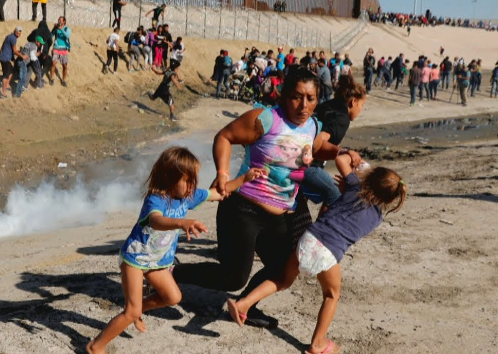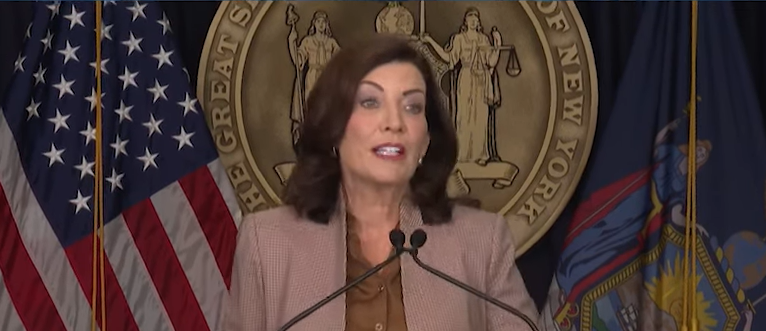Photo: YouTube
Wednesday, as the humanitarian-aid group No More Deaths and community organization La Coalición de Derechos Humanos released the third installment of their “Disappeared” report about the ongoing crisis of death and disappearance along the U.S.-Mexico border, No More Deaths and the Center for Constitutional Rights filed a Freedom of Information Act (FOIA) lawsuit against Customs and Border Protection (CBP).
The lawsuit seeks information regarding CBP policies and practices that advocates say are fueling the missing persons crisis at the border.
Hundreds of migrants die every year in the unforgiving terrain in and around the greater-Sonoran desert, on the U.S. side of the border, while crossing into the United States in search of safe haven; some estimates reach into the thousands.
Along the border, state, county, and local law enforcement refer 911 calls for emergency assistance to Border Patrol when the callers are Spanish-speaking, a discriminatory practice that effectively renders it the primary emergency services provider along the border—a role that advocates note is squarely at odds with CPB’s explicit charge as an immigration enforcement agency. Key findings in “Left to Die: Border Patrol, Search and Rescue, and the Crisis of Disappearance,” the third installment of the “Disappeared” report, show that Border Patrol is “fatally unresponsive” to emergency search and rescue requests.
The lawsuit filed Wednesday seeks documents on policies, procedures, and protocols that attorneys say are crucial to understanding the causes and effects of the crisis.
“For years, Border Patrol has acted without any transparency about their supposed rescue operations,” said No More Deaths Abuse Documentation Coordinator Parker Deighan. “Meanwhile, families and advocates searching for missing people have experienced Border Patrol’s hostility and refusal to help.”
No More Deaths and the Center for Constitutional Rights filed a Freedom of Information request in April of 2019, seeking documents and data related to Border Patrol’s response to requests for search and rescue including quantity of calls received, details of their response or lack of response, and the outcomes of each case. CBP failed to produce a single document in response to the request. The lawsuit seeks a court order compelling CBP to provide the requested documents.
According to No More Deaths’ data, in 63 percent of distress calls, Border Patrol did not conduct any confirmed search or rescue; in 40 percent of cases, there was clear documentation that the agency did not search at all. The quality of searches that were conducted was dramatically inferior to those conducted for U.S. citizens or non-citizen tourists—for example, searches rarely lasted more than one day, some lasted as little as one hour. Twenty-seven percent of searches ended without the person being found.
By contrast, local county search and rescue teams responding to cases involving U.S. citizens have a near 100-percent success rate. Meanwhile, Border Patrol also actively obstructs family and humanitarian search efforts by lying about whether a search is being conducted, harassing and criminalizing humanitarian search and rescue teams in the field, refusing to share critical information for a search or providing false or misleading information, and endlessly transferring calls to non-working, unchecked, or otherwise inapplicable phone lines, among other tactics.
“Each year, the U.S. government lets hundreds of migrants die in the borderlands out of intentional neglect,” said Angelo Guisado, staff attorney at the Center for Constitutional Rights. “Border Patrol, CBP’s enforcement arm, operates as a rogue paramilitary outfit under the guise of agency legitimization. In addition to well-publicized accounts of abusive conduct, the agency is known to employ aggressive enforcement tactics that have caused thousands of migrants to go missing in the first place. And this is the agency tasked with emergency rescue services along our border? The public deserves to know more about it.”
Alarmingly, No More Deaths also reports that Border Patrol is more than twice as likely to directly cause a person to go missing – chasing and scattering groups of people through rugged terrain, causing many to become injured, disoriented, and separated from guides and traveling companions – than it is to participate in locating one.
“If my dad was a different person, or a citizen, I think he would have received a different search,” said the daughter of a 52-year-old man from Honduras who disappeared after crossing the U.S.-Mexico border in 2016, as quoted in the report.
While No More Deaths and the Center for Constitutional Rights demand an immediate end to the transfer of calls for emergency assistance to Border Patrol, they emphasize that CBP and Border Patrol’s mission of immigration enforcement is inherently at odds with search and rescue efforts. Ultimately, they say, the only solution to the crisis of death and disappearance in the borderlands is to demilitarize the border, defund Customs and Border Protection, and decriminalize migration.
According to official government records, the remains of at least eight thousand migrating people have been found in U.S. deserts since 1994, the majority of deaths reportedly related to elemental exposure; tens of thousands more have disappeared. Both the lawsuit and the report emphasize that the crisis is not only exacerbated by Border Patrol, but was created by the agency’s 1994 “Strategic Plan” to “force [migrants to cross] over more hostile terrain,” where they may “find themselves in mortal danger,” in an attempt to discourage migration.
Read “Left to Die: Border Patrol, Search and Rescue, and the Crisis of Disappearance,” the third installment of No More Deaths’ and La Coalición de Derechos Humanos’ “Disappeared” report.
For more information on the lawsuit filed today, visit the Center for Constitutional Rights’ case page.
Learn more at ccrjustice.org.







